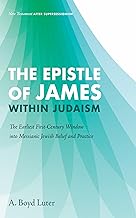By Rabbi Michael Leo Samuel

 CHULA VISTA, California — Of all the books of the New Testament that ought to appeal to a modern Jewish reader, the Epistle of James probably comes closest to the values found in the Pirke Avoth, the Ethics of the Fathers in rabbinical Judaism.
CHULA VISTA, California — Of all the books of the New Testament that ought to appeal to a modern Jewish reader, the Epistle of James probably comes closest to the values found in the Pirke Avoth, the Ethics of the Fathers in rabbinical Judaism.
In A. Boyd Luter’s new book, The Epistle of James within Judaism, the author argues that the Letter of James is the earliest New Testament document, likely written in mid-first century CE by James, the brother of Jesus. Luter’s central claim positions this letter as crucial for understanding early Messianic Jewish belief and practice. He challenges the widely accepted scholarly view that James was one of the last New Testament writings, instead asserting that James authored the letter while he was alive, between 50 and 62 CE. Luter persuasively argues that if the letter had been written after the destruction of the Temple in 70 CE, James would have likely referred to this significant event.”
From a Judaic perspective, assuming Luter’s theory is correct, perhaps the ethical aphorisms found in James might have indirectly influenced the development of Avoth. The author rejects the belief that the church replaced Israel in God’s covenant (a doctrine commonly known as supersessionism) and affirms that God’s covenant with the Jewish people remains intact. The early followers of James adhered to traditional Judaism and had little in common with Paul, who reformulated Jesus after his own image and likeness.
Luter emphasizes that Torah observance was key to the Jewish community of James, who still identified Jesus as the Messiah. James should be read within this Jewish context rather than through a lens that assumes the church has supplanted Israel. Luter argues that viewing James through a supersessionist perspective distorts its original meaning.
Bravo… This is a valid point!
Most Jewish readers are probably aware that faith plays a much more dramatic role in the life of a Christian; faith in their savior is pivotal for their salvation. Judaism, in contrast, stresses the importance of “works” over faith—moreover, works reveal the depth of one’s faith more than all the platitudes of pious declarations and religious affirmations.
James certainly believed this way as well. Luter examines this, particularly in James 2:14–26, where James stresses that faith without works is “dead and useless.” Luter contrasts this with Paul’s teaching on justification by faith alone. However, Luter concludes that James and Paul are not in conflict. James focuses on the necessity of good works as evidence of true faith, while Paul highlights justification apart from the “works of the law.” These perspectives, Luter argues, are complementary and address different aspects of faith for different audiences.
Luter’s view is consistent with that of other NT scholars who aim to harmonize James with Paul. Modern rabbis often try to harmonize dissenting rabbinical views in much the same way. This reviewer believes that differences show the diversity of the ancient teachers’ thoughts.
For this reason , the theological differences between James and Paul are more significant than Luter acknowledges.
The reviewer suggests that James’s teachings, mainly his focus on the Sermon on the Mount, may align more closely with the beliefs of the Ebionites, who rejected Paul’s teachings and considered him a heretic. In addition, the Ebionites also observed all the dietary laws and Sabbaths. Their behavior was indistinguishable from how normative Judaism was practiced in his time. For the Ebionites, Jesus encouraged every one of his disciples to be “messianic” in redeeming the world. Jesus emerges as a “great example” rather than “the great exception.” The early Christian Church considered the Ebionites “heretical” because they thought Jesus was purely human, born of Joseph and Mary, and denied his divine nature—primarily as taught by Paul.[1] It is doubtful that the brother of Jesus, James, would have differed in this critical respect.
The reviewer suggests that James may have shared views similar to those of Paul’s critics, indicating a deeper disagreement between their theological positions than Luter acknowledges. This raises a crucial question for modern Messianic Jews: Can they continue to align with traditional Christian doctrines that are rooted in Pauline theology?
Martin Luther deserves to be commended for asserting that the Letter of James is “an epistle of straw” and condemned this book as being “too Jewish” — and for good reason!
The book has valuable historical data that students of the first century should find interesting. Comparing the Ebionites and James might have added an alternative view that aligned James with Judaism more closely than is commonly realized.
[1] . Early Christian writers like Irenaeus, Origen, and Epiphanius targeted them in their works.
*
Rabbi Michael Leo Samuel is spiritual leader of Temple Beth Shalom in Chula Vista.